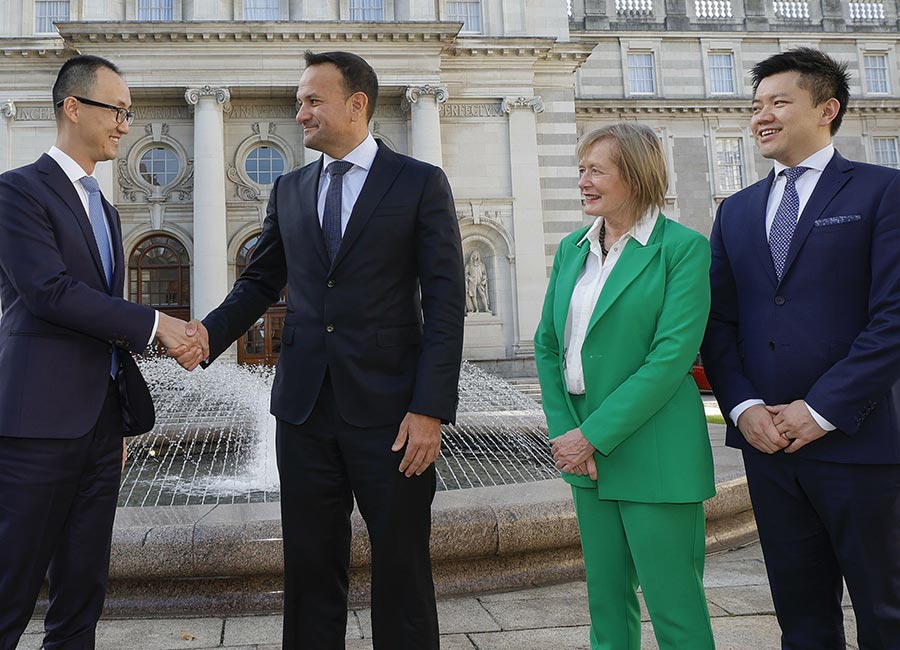Though Ireland is effectively an aircraft carrier for American multinational jets to target markets in Europe, the Middle East and Africa, the green flight deck is open to all-comers.
China’s national tech champion Huawei has been active on the Emerald Isle since 2004, and recently announced a significant expansion.
The Shenzhen giant, with 194,000 people on the payroll globally, is establishing its European cloud services hub in Dublin, with a stated investment cost of €150m and the promise of 200 new jobs by 2027, in roles such as sales, legal, tax, operational, and research.
Huawei Cloud is muscling in on the space dominated by Amazon AWS and Microsoft Azure. Though late to the party, Huawei Cloud claims to be the world’s fastest growing major cloud service provider.
The company’s 2021 annual report says 220 cloud services and 210 solutions have been launched, and that the service has attracted over 30,000 partners and 2.6 million developers. The report adds that 6,100 applications are now available on the Huawei Cloud Marketplace.
Huawei is best known for its mobile phones, and devices accounted for 54% of annual turnover in 2020. That proportion shrunk to 38% in 2021, as group sales declined 29% to €89bn. The reasons for this tanking at the consumer divisions are glossed over in the report to shareholders.
The Huawei Cloud project is receiving undisclosed state aid, and at the jobs announcement Tánaiste at the time Leo Varadkar was very enthusiastic about the Chinese investment.
“It’s an endorsement of Ireland as an enterprise-friendly environment where companies like Huawei can grow and prosper,” Varadkar stated.

IDA Ireland is hopeful that Huawei’s expanded presence will facilitate Chinese and Asian enterprises to increase investment in Ireland.
Tim Tao, who leads the Huawei Cloud operation in Europe, talked of “building the cloud foundation for an intelligent world with ubiquitous cloud and pervasive intelligence”.
Tony Yangxu, CEO of Huawei Ireland, said Ireland is now a strategically important location for the global deployment of Huawei Cloud. “Digitalisation represents the biggest opportunity for all industries over the next decade, and it is set to supercharge the cloud sector,” he added.
Following Washington's lead
In the main, Huawei has been in the news in recent years due to its 5G mobile infrastructure. The technology is top-notch but America believes connecting mobile phones to the Huawei back-end is a potential security risk, for the United States.
The UK agrees, of course, though last year sales at the Huawei carrier and enterprise business units were on a par with the previous year.
In November, the Biden administration banned approvals of new telecoms equipment from Huawei and ZTE because they pose "an unacceptable risk" to US national security.
New rules also bar the sale or import of new equipment made by Chinese surveillance equipment maker Dahua Technology, video surveillance firm Hangzhou Hikvision Digital Technology, and telecoms firm Hytera Communications.
"These new rules are an important part of our ongoing actions to protect the American people from national security threats involving telecommunications," stated FCC chairwoman Jessica Rosenworcel.
Now it seems that Ireland is following the Washington lead too, after Green Party Minister of State for Communications Ossian Smyth tabled amendments to draft legislation, empowering the government to ban equipment from ‘high-risk vendors from Ireland’s telecoms infrastructure.
The Irish Times reported that lobby group Digital Business Ireland has complained to government than banning Huawei kit and forcing businesses to rebuild their digital platform from scratch would increase costs and reduce the competitiveness of Irish businesses.
“DBI is concerned that the powers provided to the minister through these amendments may inadvertently result in an increase in the cost of broadband for businesses and further delay the rollout of broadband in rural areas, compounded by a lack of competition in the market,” the DBI stated.











